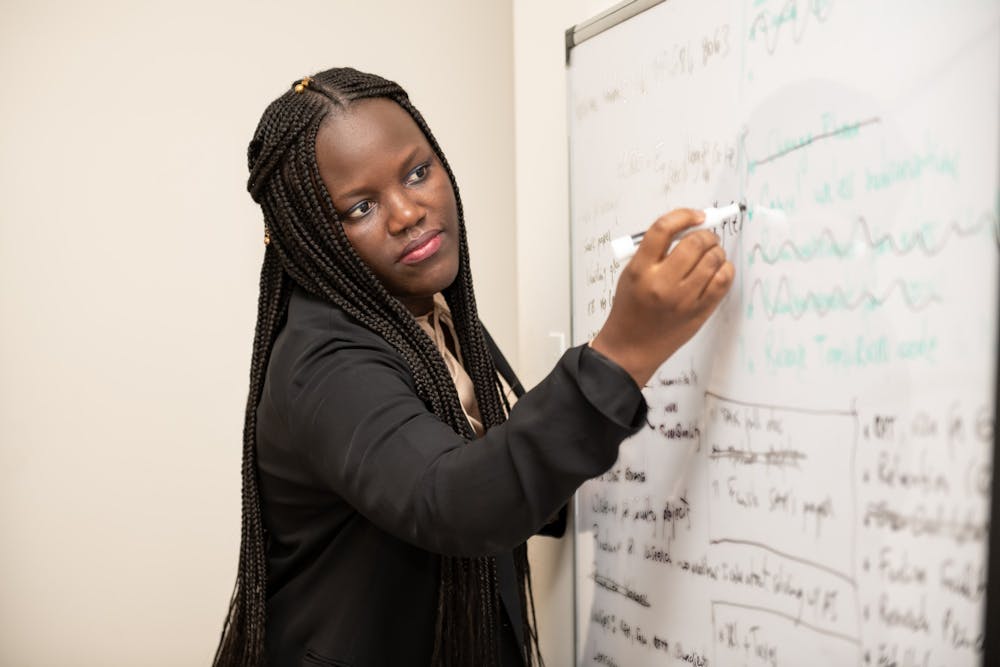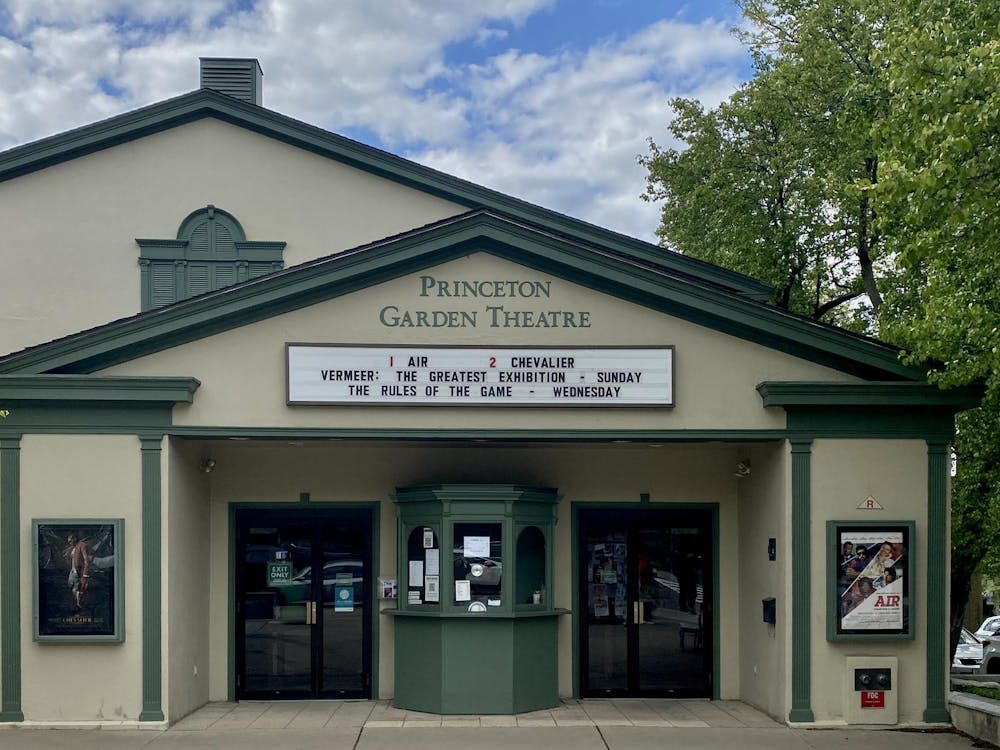Come next September, Adji Bousso Dieng — an expert in artificial intelligence and machine learning — will join the faculty of the School of Engineering and Applied Science (SEAS) as a tenure-track assistant professor, becoming the first Black female faculty member in the history of SEAS and the first Black faculty member ever in the Department of Computer Science (COS).
Dieng’s historic appointment comes as SEAS prepares to mark its centennial anniversary.
Dieng said that since she announced the news on Twitter, a wide range of students and community members have expressed how much her achievements mean to them.
“I received many messages from Princeton engineering students telling me how excited they are about my joining the institution. Some are even considering switching to computer science,” she said.
“That’s the power of representation.”
Zyanne Clay-Hubbard ’21, a senior COS concentrator, characterized Dieng’s appointment as a “huge milestone,” albeit one that is “wildly overdue.”
“It’s frustrating to think I might not have the chance to take a course with her before I graduate, but I am extremely excited to think of the impact she might have on Black female undergrads in this department and across SEAS in the future,” Clay-Hubbard wrote to the ‘Prince.’ “Just her presence means the world.”
Dieng, who received a Ph.D. in statistics from Columbia University, is a foremost expert in the generative modeling branch of machine learning.

The approach allows researchers to create models and simulations from unlabeled pieces of data, with broad applications in marketing, political science, digital humanities, recommendation systems, and public health.
“The core idea behind generative modeling is that you can learn everything there is to learn about the data if you learn to simulate data that looks like the data you observe,” she said in an interview with The Daily Princetonian.
“So you have to come up with a good story for how the data you observe were to come about. My work is about making the process describing the story for the data both flexible and interpretable.”
Born and raised in Kaolack, a region in western Senegal, Dieng won a competition in high school hosted by the Pathfinder Foundation for Education and Development and the Central Bank for West African States.

That secured her a €60.000 scholarship to study abroad at Télécom ParisTech in Palaiseau, France. After four years there — which included an opportunity to study at Cornell University — Dieng graduated with a dual degree: a Diplôme d’Ingénieur from Telecom ParisTech and a master’s degree in statistics from Cornell.
From there Dieng joined the World Bank for a year, with the hope she could “positively impact Africa.” She currently works as a researcher at Google, contributing to an undisclosed project in generative modeling.
For Dieng, becoming an educator was particularly significant, as her father did not attend school and her mother did not complete high school.
Jennifer Rexford ’91, chair of the computer science department, said that she looks forward to welcoming Dieng — a “fantastic scholar and colleague” — to the department.
“She is highly collaborative, so I see her as someone poised to have a broad impact around campus and be a role model to others,” Rexford said. “Also, she is a passionate advocate for diversity, including her work with Women in Machine Learning, Black in AI, the Indaba Deep Learning summer school in Africa, and Latinx outreach.”
Rexford emphasized that the field of computer science must represent the society it serves.
“As computer scientists, we have a responsibility to ensure the technology we design is worthy of the trust society increasingly places in it,” she said, adding, “as educators, we have a responsibility to teach our students how to take on this responsibility in their own work.”
Rexford explained that long-standing hiring and recruitment practices have contributed to the historical and contemporary underrepresentation of minorities in computer science, especially in artificial intelligence.
Many academic departments — at the University and elsewhere — hire at most one to two new tenure-track faculty members each year.
“In some years, a department may need to hire in a particular topic area because of a recent departure or retirement, because of the need to have good ‘coverage’ of the field for both research and teaching,” she said.
Candidates who receive an offer, however, may ultimately accept a position at another school. Those who do accept an offer may wait before starting their position at the University.
It is for this reason, Rexford said, that faculty demographics change slowly.
“A big part of the challenge is how much great talent we lose across all stages of the “pipeline” from K-12 through graduate school, due to the inequality and systemic racism in our society,” she added. “That said, the scale and scope of the challenge cannot make us complacent.”
In a May interview with the ‘Prince,’ SEAS Dean Andrea Goldsmith, who entered the role earlier this month, said that diversifying the field requires “recognizing that implicit bias plays a big role in discouraging underrepresented groups from pursuing the profession in the first place, and then from staying in it long-term.”
According to Dieng, the negative feedback loop that results from underrepresentation presents as pressing a challenge as do low retention rates.
“It’s sad that people associate diversity with lowering standards when it’s the opposite,” she said. “There are a lot of talented people from underrepresented groups out there who are only waiting to be given a chance.”
“Oftentimes people from these groups don’t even apply to things because they don’t see people that look like them in these elite places and they will think it’s because they don’t have the expertise to be hired,” she added.
Though her experience in the COS department has been “generally positive,” Clay-Hubbard said that the underrepresentation of women — particularly Black women — has always been strikingly apparent.
Often the only Black woman in a departmental course, Clay-Hubbard said she feels disconnected from her concentration.
“I love computer science, I enjoy the work I do for class, and I’m excited for the career that I’m starting,” she said. “But when I think of the ways I might identify myself as a Princeton student, my department is always last on the list.”
As of this fall, 40 percent of COS majors at the University are women, making computer science the second most popular major for women on campus, according to data provided to the ‘Prince’ by the Department of Computer Science.
Underrepresented minority (URM) students — including Black, Hispanic, and Native American students — comprise between 12 and 14 percent of undergraduate COS majors, in comparison to around 21 percent of the undergraduate population as a whole.
Per the statistics provided by the Department of Computer Science, the department retains 58 faculty members, including 45 tenure-track faculty and 13 lecturers. Of those, 13 are women — nine tenure-track faculty and four lecturers — none of whom are URM professors.
Effective fall 2021, 14 women and two URM faculty members (Dieng and Andrés Monroy-Hernández, both assistant professors) will hold positions in the department. Monroy-Hernández is currently a principal researcher at Snap Inc. and an affiliate faculty at the University of Washington.
As campus activists have demanded a more diverse faculty, the University recently outlined a list of “initial priorities” to combat systemic racism on campus, including an institution-wide goal to “increase by 50 percent the number of tenured or tenure-track faculty members from underrepresented groups over the next five years.”
In an email sent out to the computer science community last week, Rexford reaffirmed the department’s commitment to playing a “stronger role in combating racism.”
Rexford outlined a number of initiatives the department plans to undertake, including creating independent work seminars in support of diversity, developing a Broadening Participation in Computing (BPC) plan, supporting student-led projects, establishing a Visiting Scholars Program, incorporating inclusion and diversity materials to departmental-level orientation sessions, and hosting periodic town halls — as well as maintaining existing diversity initiatives.
According to a 2019 report released by the American Society of Engineering Education, in SEAS as a whole, 36 percent of engineering bachelor’s degrees and 43.5 percent of engineering master’s degrees were awarded to women, ranking the University 15th and 16th in the nation, respectively. Furthermore, 17.4 percent of master’s degrees were awarded to underrepresented minorities.
“But I do think it’s important to note that one professor certainly isn’t enough. I hope Princeton knows that, and that this is just the beginning of a long, multi-faceted process to make SEAS and all STEM departments more diverse and inclusive,” Clay-Hubbard noted.
Dieng — who revealed that she has never been taught by a Black lecturer since leaving Senegal — said that sometimes she forgets she is the “only one of [her] kind in the classroom.”
“But sometimes it just hits you that you are the only Black person in the room, and that’s when things become challenging emotionally,” she said.
The challenges she’s overcome have not been lost on engineering students at the University.
“I hope that Dr. Dieng knows just how much she’s appreciated,” Clay-Hubbard said. “Being the ‘first Black woman’ to do anything is a huge accomplishment, but it can also be a burdensome responsibility, and I hope she knows that I, for one, am highly grateful for her choice to take the leap in spite of that.”
In the wake of a national reckoning with systemic racism, Dieng said she remains optimistic about what the future holds.
“Within the academic community, I have seen people waking up to racism, asking for book recommendations, forming study groups around race and racism,” she said. “Academic institutions have implemented some changes.”
Even so, Dieng maintained that those changes — such as the University removing the name of Woodrow Wilson, Class of 1879, from the School of Public and International Affairs and the American Statistical Association renaming one of its most prestigious awards and lectureships — are “tiny steps.”
“[What] needs to be done is to rethink and redesign our institutions in such a way that people from all walks of life can flourish and achieve their fullest potential,” she said. “That’s the hard work.”








